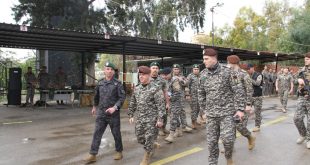###مقال أميركي: “ذعر في صفوف حزب الله بعد تفجيرات الـ”بيجر”: سيناريو أشبه بفيلم جيمس بوند”
شهد لبنان حادثة غير مسبوقة يوم الثلاثاء، حينما انفجرت أجهزة النداء التي يستخدمها عناصر حزب الله في وقت واحد، مما أثار الفوضى والذعر في صفوف الحزب. ووصف الكاتب ديفيد إغناثيوس في مقاله بصحيفة “واشنطن بوست” المشهد بأنه أقرب إلى سيناريو من أفلام جيمس بوند، حيث تم التخطيط للهجوم بدقة عالية وذكاء كبير.
### تفاصيل العملية
تفجرت أجهزة الـ”بيجر” التي كانت بحوزة مئات من عناصر حزب الله في مناطق متعددة من لبنان، مما أدى إلى إصابة العديد وسقوط قتلى. ورغم عدم إعلان إسرائيل مسؤوليتها عن الهجوم، إلا أن التحليل الأمني يشير إلى أن إسرائيل هي الجهة الوحيدة القادرة على تنفيذ عملية بهذا القدر من التعقيد، حيث جمعت بين الحرب السيبرانية والتخريب المادي.
### رسالة إسرائيل إلى حزب الله
أوضحت التفجيرات رسالة قوية من إسرائيل إلى حزب الله، تفيد بأن إسرائيل قادرة على اختراق أي مساحة يعمل فيها الحزب. ونُقل عن مصادر إسرائيلية مطلعة أن حزب الله يجب أن يأخذ في الاعتبار أن إسرائيل قد تمتلك المزيد من المفاجآت.
### رد الفعل الأمريكي
على الرغم من محاولة المسؤولين الأمريكيين النأي بأنفسهم عن هذه العملية، إلا أن الهجوم جاء في توقيت حساس، وسط التوترات المتزايدة في المنطقة. وقد أكدت إدارة بايدن أنها لم تكن على علم مسبق بالهجوم، معبرة عن مخاوفها من تصعيد جديد قد يقود إلى حرب إقليمية شاملة.
### تأثير الهجوم على حزب الله
الهجوم ترك حزب الله في حالة من الارتباك والذعر، حيث سارع الحزب إلى اتخاذ إجراءات لحماية شبكته العسكرية. وعلى الرغم من أن الحزب زود أعضائه بأجهزة اتصال خاصة، إلا أن الهجوم أظهر قدرة إسرائيل على اختراق هذه الأجهزة وتحويلها إلى أدوات دمار.
### بداية حقبة جديدة من الحروب السيبرانية
يرى إغناثيوس أن الهجوم يمثل بداية لمرحلة جديدة وخطيرة في الحروب السيبرانية، حيث يمكن تحويل أي جهاز متصل بالإنترنت إلى سلاح. وقد ذكر أن البرمجيات الخبيثة التي استخدمتها إسرائيل قد أدت إلى تفجير أجهزة الـ”بيجر” بتزامن مثالي، مما يجعل هذا الهجوم تقنية عالية المستوى وغير مسبوقة في الحروب المعاصرة.
### American Comment: “Panic in Hezbollah Ranks After Pager Explosions: A James Bond-Style Scenario”
On Tuesday, Lebanon witnessed a scene reminiscent of a James Bond movie, as pagers carried by hundreds of Hezbollah members simultaneously exploded across the country. In an article for The Washington Post, writer David Ignatius described the operation as a sophisticated Israeli strike combining cyber warfare and sabotage.
### The Details of the Operation
The synchronized explosions of Hezbollah’s communication devices sent shockwaves through the group. Although Israel did not claim responsibility, experts suggest that no other nation could have pulled off such a complex and bold attack, combining cyber intelligence with physical sabotage.
### Israel’s Message to Hezbollah
The explosions were a clear message from Israel to Hezbollah: “We control your space.” Israeli sources indicated that Hezbollah should brace for more surprises, emphasizing that Israel has the technological upper hand.
### U.S. Reaction
American officials quickly distanced themselves from the operation, with President Biden's administration stating that they had no prior knowledge of the attack. The timing of the incident could not have been worse, as tensions in the region rise amid a growing risk of a broader conflict. This escalation comes just weeks before U.S. presidential elections, making any hope for a ceasefire in Gaza or negotiations with Hezbollah increasingly distant.
### Hezbollah in Chaos
The attack has left Hezbollah in a state of confusion and panic. Despite the party's efforts to secure its communications by providing members with encrypted devices, the fact that Israeli operatives managed to tamper with the pagers shows a deep breach of Hezbollah’s security network.
### A New Era of Cyber Warfare
Ignatius highlights that the attack marks the dawn of a new and dangerous era in cyber warfare. The ability to turn any internet-connected device into a weapon could have far-reaching consequences. In this case, Israel reportedly planted malicious software within the pagers' systems, triggering explosions at the precise moment. The sophistication of this operation demonstrates a significant leap in the conduct of modern warfare.
 International Scopes – سكوبات عالمية إجعل موقعنا خيارك ومصدرك الأنسب للأخبار المحلية والعربية والعالمية على أنواعها بالإضافة الى نشر مجموعة لا بأس بها من الوظائف الشاغرة في لبنان والشرق الأوسط والعالم
International Scopes – سكوبات عالمية إجعل موقعنا خيارك ومصدرك الأنسب للأخبار المحلية والعربية والعالمية على أنواعها بالإضافة الى نشر مجموعة لا بأس بها من الوظائف الشاغرة في لبنان والشرق الأوسط والعالم




